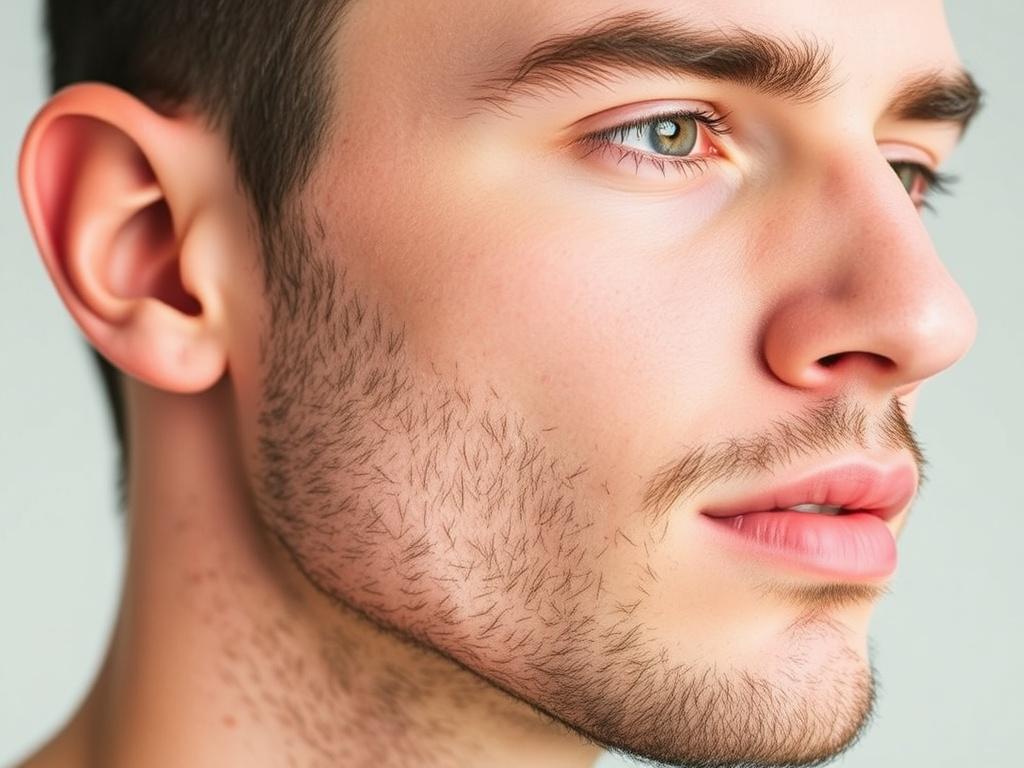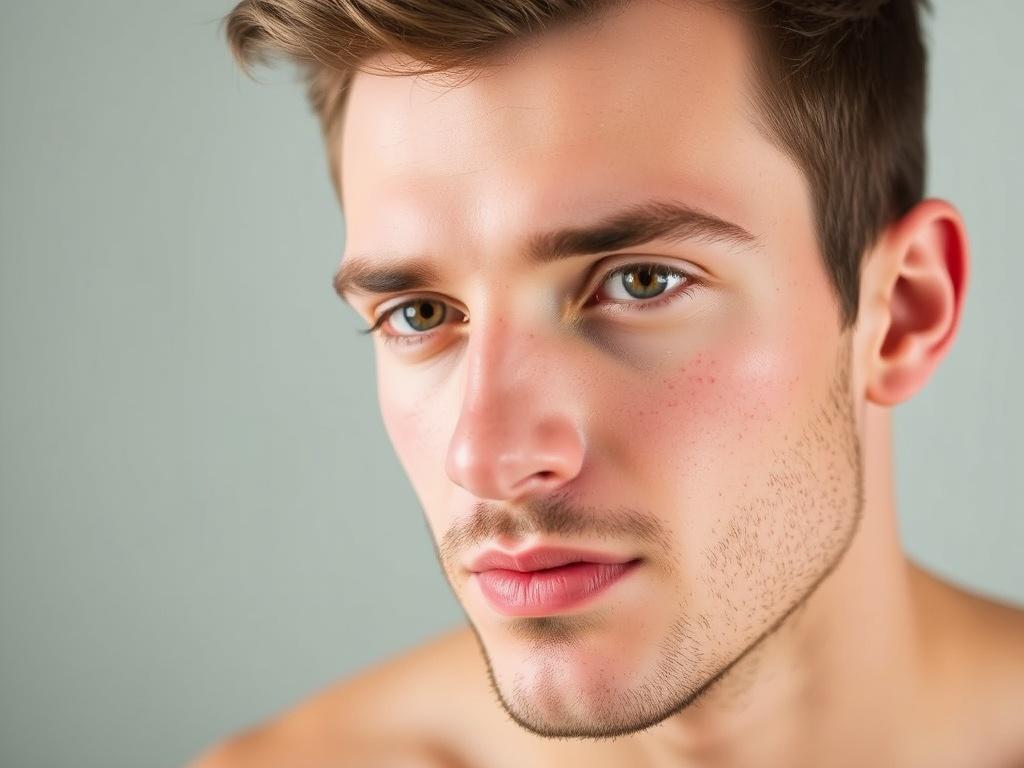Содержание статьи
Acne is often thought of as a teenage problem, but men of all ages can experience this frustrating and sometimes painful skin condition. Whether you’re dealing with occasional breakouts or persistent cystic acne, understanding the underlying causes and exploring effective solutions can make a significant difference. In this article, we’re going to take a deep dive into men’s acne – what causes it, why it may be different from women’s acne, and how you can manage it effectively. From the impact of hormones to skincare habits and lifestyle factors, we’ll cover everything you need to know to reclaim clear, healthy skin.
Understanding Men’s Acne: Why It Happens

Acne occurs when hair follicles become clogged with oil and dead skin cells, creating an environment where acne-causing bacteria can thrive. For men, this process is often influenced by a unique mix of factors. One key factor is hormones. Testosterone and other androgens play a significant role in the production of sebum, the oily substance that keeps skin lubricated. When hormone levels spike, such as during puberty or periods of stress, the sebaceous glands produce excess oil. This excess oil, combined with dead skin cells, blocks pores leading to the formation of blackheads, whiteheads, pimples, or even deeper cysts.
But men’s acne isn’t just about hormones. Other causes can include genetics, lifestyle habits, and skin care routines (or lack thereof). Some men might find that shaving irritates their skin, leading to breakouts around the jawline and neck. Others may notice flare-ups connected to stress, diet, or sweat from exercise. Understanding these causes is the first step toward crafting a personal acne treatment plan that works.
Hormones and Male Acne: What’s the Connection?
Men generally have higher levels of androgens than women, and these hormones stimulate the sebaceous glands to produce more oil. This is why many young men experience severe acne during their teenage years as hormone levels surge. However, adult men aren’t immune either. Hormonal imbalances caused by factors such as stress, certain medications, or underlying medical conditions can trigger or worsen acne at any age.
In addition to causing increased oil production, androgens also affect the quality of the sebum, making it thicker and more likely to clog pores. This hormonal influence explains why men may deal with tougher, more inflamed acne than women and why it may often concentrate in the beard area and lower face.
Genetic Predisposition
Just like many other skin conditions, genetics play a role in who gets acne and how severe it can be. If your father or brothers had persistent acne, chances are you might be predisposed to developing it as well. Genetic factors impact skin type, hormone sensitivity, and inflammatory responses, all of which contribute to acne development.
Common Triggers of Men’s Acne

It isn’t just hormones and genetics that cause acne in men. Various external and lifestyle factors can trigger flare-ups or worsen existing acne. Let’s look at some of the most common triggers:
- Shaving and Skin Irritation: Frequent shaving or using dull blades can irritate the skin, causing razor burn or ingrown hairs that appear as bumps or pimples.
- Stress: Stress raises levels of cortisol, a hormone that can exacerbate acne by stimulating oil production and inflammation in the skin.
- Poor Skincare Habits: Using harsh soaps, skipping cleansing routines, or applying the wrong skincare products can clog pores and cause breakouts.
- Diet: While the science is still evolving, high glycemic foods and dairy products have been linked to acne in some men, possibly due to their effect on hormones.
- Exercise and Sweat: Sweat left on the skin, especially under tight clothing or helmets, can clog pores and lead to acne mechanica, an acne type caused by friction.
- Environmental Factors: Pollution, humidity, and exposure to dirt can increase the risk of clogged pores and acne.
Recognizing these triggers can help you adjust your lifestyle and habits to prevent unnecessary flare-ups.
The Role of Diet in Men’s Acne
Many men don’t realize how what they eat can impact their skin. Although diet doesn’t cause acne directly, it can influence its severity. Research shows that foods with a high glycemic index — such as sugary snacks, white bread, and soft drinks — cause blood sugar spikes that increase insulin levels. High insulin leads to more sebum production, creating favorable conditions for acne.
Dairy products, particularly skim milk, have also been implicated in some studies. They may affect hormones in a way that promotes acne in certain individuals. If you notice your acne flaring after consuming these foods, consider moderating your intake to see if your skin improves.
Recommended Foods for Clear Skin
| Food Group | Benefits for Skin | Examples |
|---|---|---|
| Fruits & Vegetables | Rich in antioxidants and vitamins that reduce inflammation | Blueberries, spinach, carrots, kale |
| Omega-3 Fatty Acids | Help reduce inflammation and promote skin healing | Salmon, walnuts, flaxseeds |
| Low-Glycemic Whole Grains | Slowly release energy, preventing insulin spikes | Quinoa, brown rice, oats |
| Probiotics | Support gut health which can influence skin condition | Yogurt, kefir, sauerkraut |
Adopting a balanced diet filled with these foods can create a foundation for healthier skin alongside other treatments.
Effective Skincare Solutions for Men’s Acne

When it comes to managing men’s acne, a consistent and appropriate skincare routine is crucial. Many men either neglect their skin or use products intended for women that may not suit their skin type. The goal is to keep the skin clean, control oil production, and target acne-causing bacteria without over-drying or irritating the skin.
Step-by-Step Skincare Routine
- Gentle Cleansing: Wash your face twice daily with a mild, sulfate-free cleanser designed for acne-prone skin. Avoid harsh soaps that strip away natural oils.
- Exfoliation: Use a chemical exfoliant containing salicylic acid or glycolic acid 2-3 times a week to remove dead skin cells and unclog pores.
- Treatment Products: Apply topical treatments such as benzoyl peroxide, retinoids, or niacinamide based on your acne severity. These ingredients help reduce bacteria, inflammation, and promote cell turnover.
- Moisturizing: Even oily skin needs hydration. Use a lightweight, non-comedogenic moisturizer to maintain the skin’s barrier.
- Sun Protection: Protecting your skin from UV damage is critical, especially when using acne treatments that increase sun sensitivity. Choose an oil-free, broad-spectrum sunscreen daily.
Special Considerations for Shaving
Since shaving can irritate acne-prone skin, men should consider these tips to minimize breakouts:
- Use a clean, sharp razor to reduce skin trauma.
- Shave after cleansing and softening the skin with warm water.
- Try electric razors or clippers for less irritation if traditional razors cause issues.
- Apply a soothing aftershave balm that is alcohol-free and non-comedogenic.
When to See a Dermatologist
If over-the-counter treatments and lifestyle adjustments don’t clear up your acne, it’s time to consult a dermatologist. Severe acne, such as nodules or cysts, can cause scarring if untreated and often require prescription medications like oral antibiotics, hormonal therapy, or isotretinoin. A skin specialist can customize a treatment plan based on your skin type, acne severity, and lifestyle. Early professional intervention can prevent long-term damage and improve quality of life.
Lifestyle Tips to Support Acne-Free Skin
Beyond skincare products and medications, several lifestyle habits can help maintain clearer skin:
- Manage Stress: Practice mindfulness, exercise regularly, and get enough sleep to keep hormone levels balanced.
- Keep Hair and Face Clean: Wash after heavy sweating, and avoid touching your face to prevent transferring dirt and oils.
- Avoid Heavy or Oily Comedogenic Products: This includes some hair gels, sunscreen, and aftershaves that can clog pores.
- Stay Hydrated: Drinking plenty of water supports skin hydration and detoxification.
The Psychological Impact of Men’s Acne
It’s important to acknowledge the emotional toll that acne can take, especially for men who may feel self-conscious or reluctant to seek help. Acne can affect confidence, social interactions, and even professional opportunities. Overcoming this stigma and understanding that acne is a common and treatable condition can empower men to take proactive steps toward better skin health.
Conclusion
Men’s acne is a multifaceted skin condition influenced by hormones, genetics, lifestyle, and skincare practices. With its unique challenges, such as hormonal surges and the impact of shaving, men need tailored solutions to effectively combat acne. By understanding the causes—from hormonal imbalances to diet and environmental triggers—you can make informed choices that support clearer skin. Incorporating a consistent skincare routine with gentle cleansing, targeted treatments, and protective moisturizing, alongside mindful lifestyle changes, can significantly reduce breakouts. When acne persists or worsens, consulting a dermatologist ensures you receive the best care possible. Remember, managing acne is not just about appearance – it’s about feeling confident and comfortable in your skin every day.

